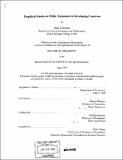Empirical studies in public economics in developing countries
Author(s)
Khemani, Stuti
DownloadFull printable version (7.599Mb)
Other Contributors
Massachusetts Institute of Technology. Dept. of Economics.
Advisor
Abhijit Banerjee.
Terms of use
Metadata
Show full item recordAbstract
This thesis consists of three empirical studies that address issues of public economics in developing countries. Two broad questions motivated me in turn: one, the effect of household institutions on the provision of old age security; and two, the effect of political institutions on government policy and performance. Chapter 1, entitled Inter-generational Transfers and Intra-household Bargaining: Evidence from Indonesia, examines whether there is bargaining between husbands and wives within the donor household over transfers to their respective parents, using a household survey from Indonesia. The evidence is that wives' education and income have a significant positive effect on transfers to their parents, and no effect on transfers to their husbands' parents. In addition, women who are gainfully employed and who have greater dowries from the time of their marriage are more likely to make transfers to their parents. This evidence is consistent with a model of collective decisionmaking where education and income influence the bargaining power of women and therefore the allocation of household resources. It also implies that intergenerational transfers may be viewed as returns to dowry and human capital investments made by parents. These interpretations are not incompatible-- parental investment may endow daughters with the bargaining power to channel resources towards their parents. In conclusion, the evidence addresses both gender roles in providing support to elderly parents and returns to parental investment in old age security, in the context of developing countries with no public social security system. Both issues have enormous policy ramifications for income redistribution programs and the design of formal social security institutions for economies with traditional inter-household arrangements. Chapter 2, entitled Effect of Electoral Accountability on Economic Policy in India, studies the effect of state legislative assembly elections on the economic policies of state governments in 14 major states of India, over the period 1960-1994. The effect of the timing of elections on economic policies is identified using an instrument for the electoral cycle that distinguishes between constitutionally scheduled elections and midterm polls. Election years have a negative effect on commodity taxes, a positive effect on capital spending, and a positive effect on road construction by public works departments. The Indian political cycle is of greater magnitude than any comparable cycle in the developed countries. In addition, unlike political budget cycles in OECD countries that are accompanied with higher budget deficits, state elections in India have no effect on state deficits. This evidence is consistent with a moral hazard model where career concerns persuade politicians to improve performance. The electoral cycle in policy is generated by high discounting of the future in an uncertain political environment. The pattern suggests that state governments strategically manipulate economic policies to increase the provision of public services, without increases in taxes and deficits, in order to influence the probability of reelection. Chapter 3, entitled Partisan Politics and Intergovernmental Transfers in India, studies the effect of partisan politics on budgetary transfers from the central to the state governments in India. Using a panel of 14 major Indian states, from 1960 to 1994, it tests for the effect of the party affiliation of a state government on grants and loans from the center, and its share in central taxes. The results indicate that when a state government is politically affiliated with the party governing at the center it receives significantly greater grants per capita, 10 per cent higher than the average per capita grants. The timing of state elections has no significant effect on central grants. These results are consistent with a model of partisan manipulation of grants within a system of centralized decisionmaking. Central governments give greater grants to affiliated states in order to exercise greater control over state spending.
Description
Thesis (Ph.D.)--Massachusetts Institute of Technology, Dept. of Economics, c1999. Includes bibliographical references.
Date issued
1999Department
Massachusetts Institute of Technology. Department of EconomicsPublisher
Massachusetts Institute of Technology
Keywords
Economics.